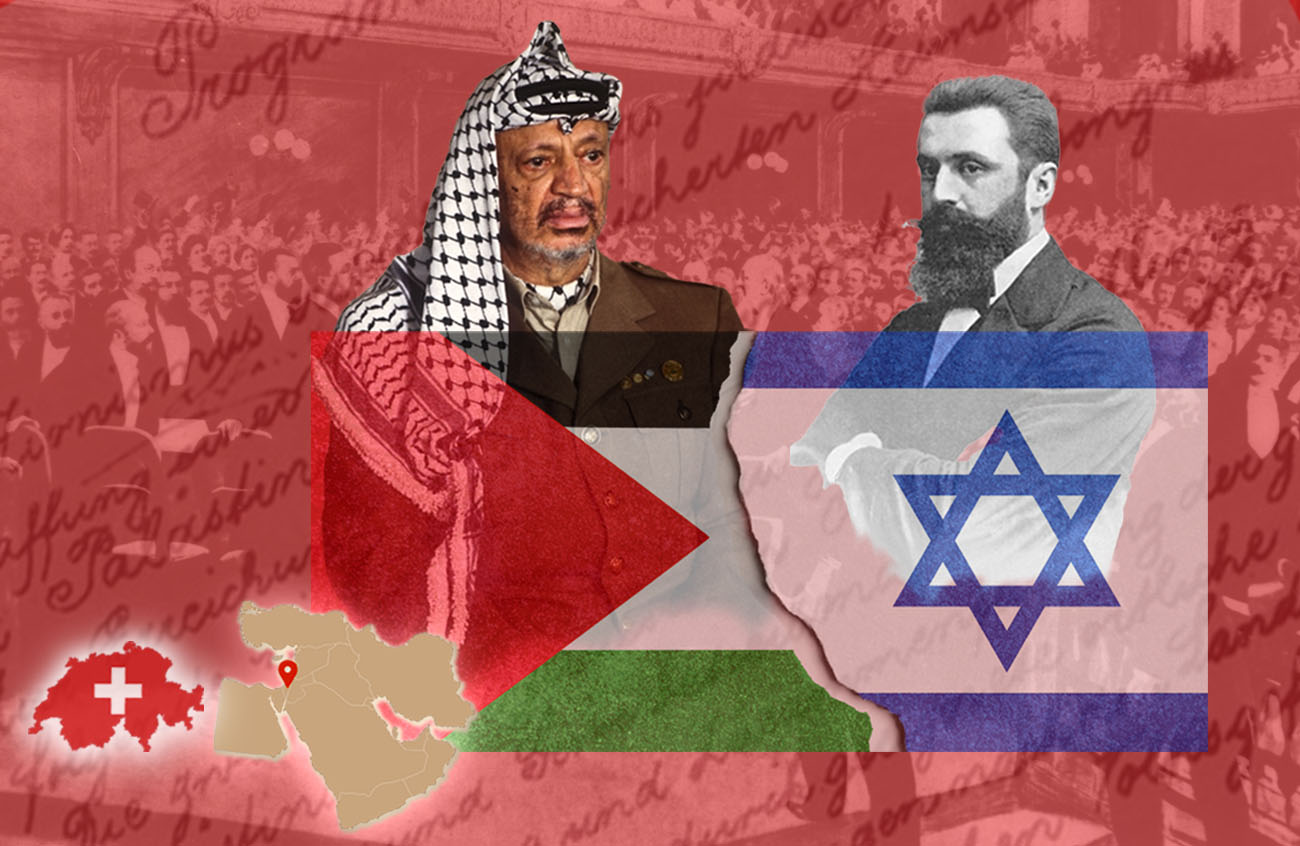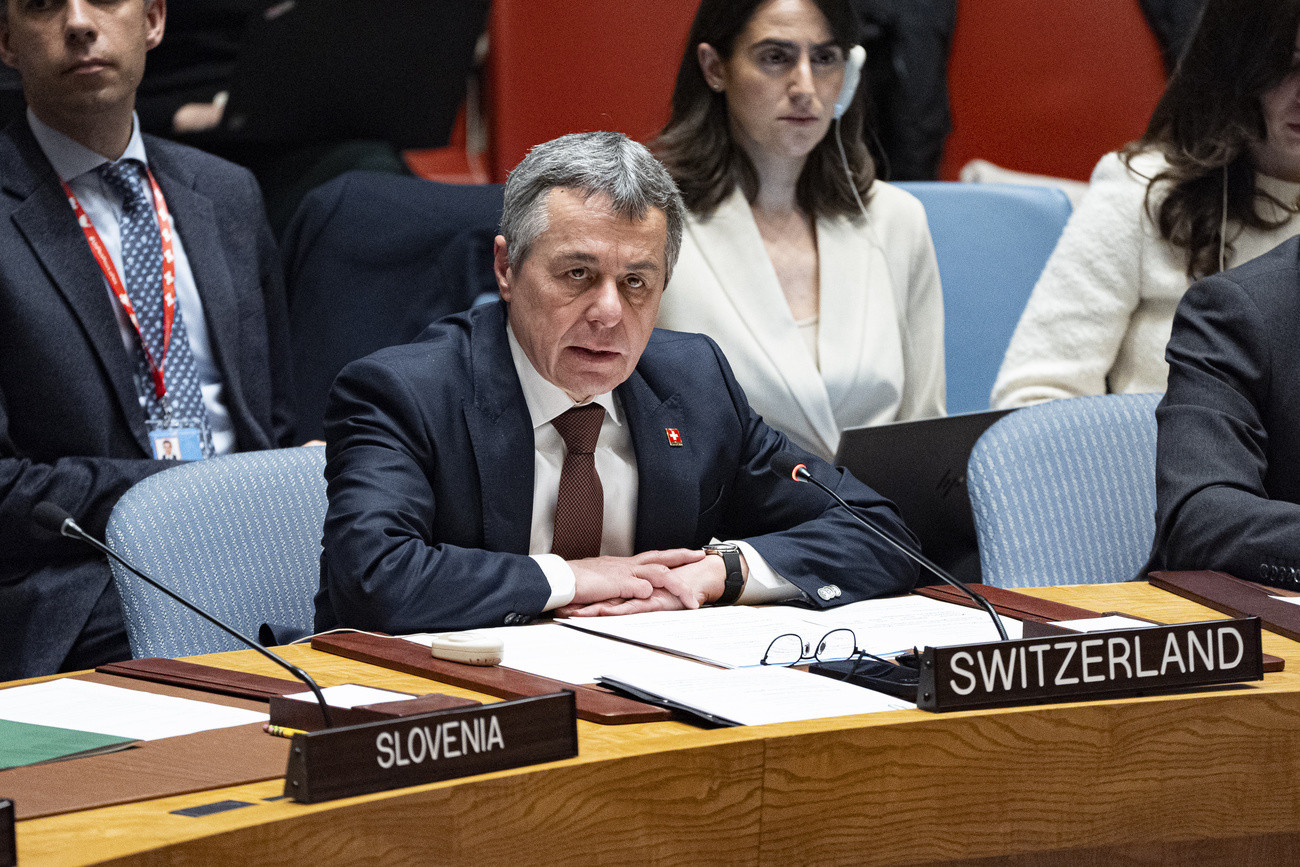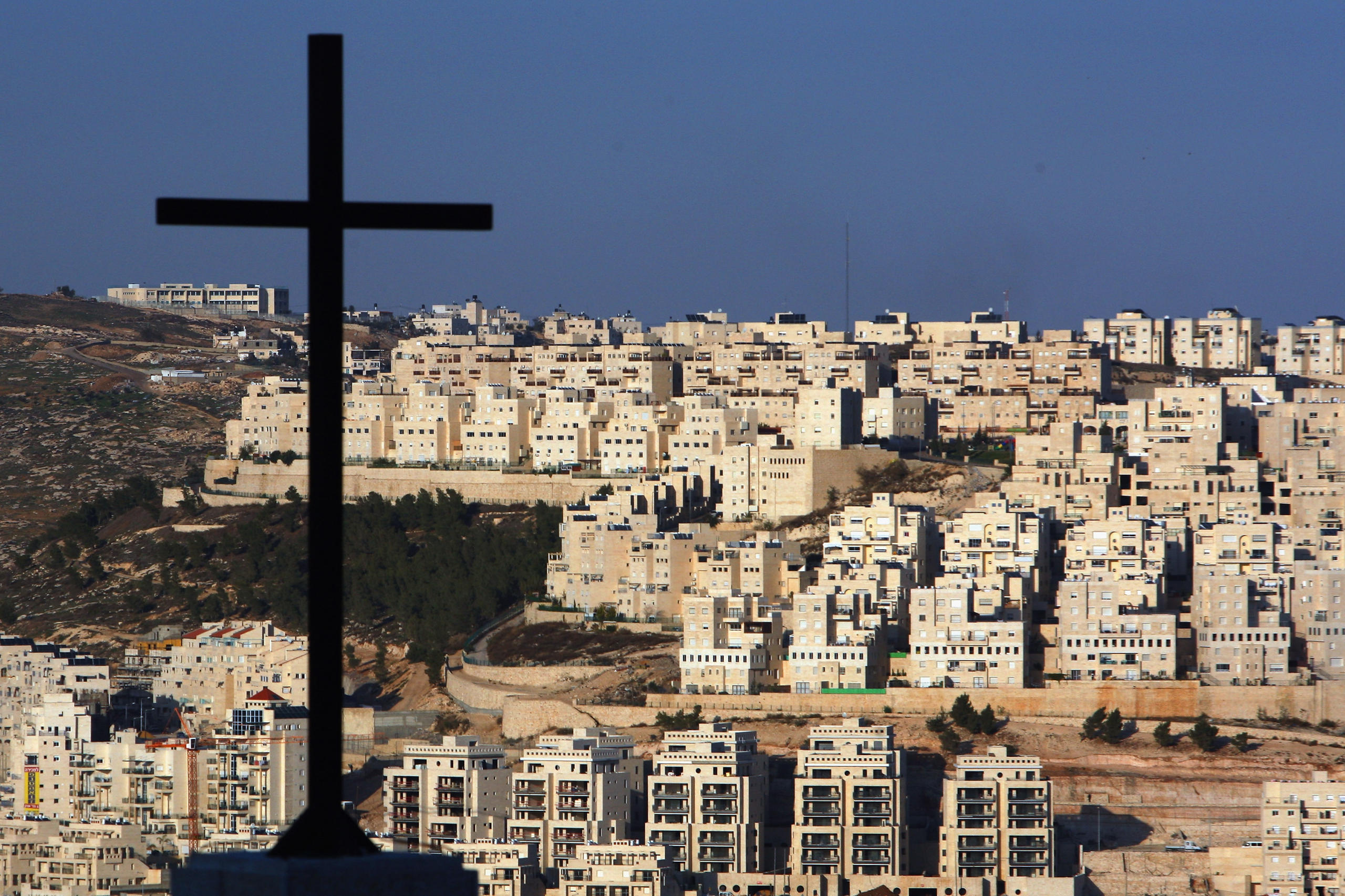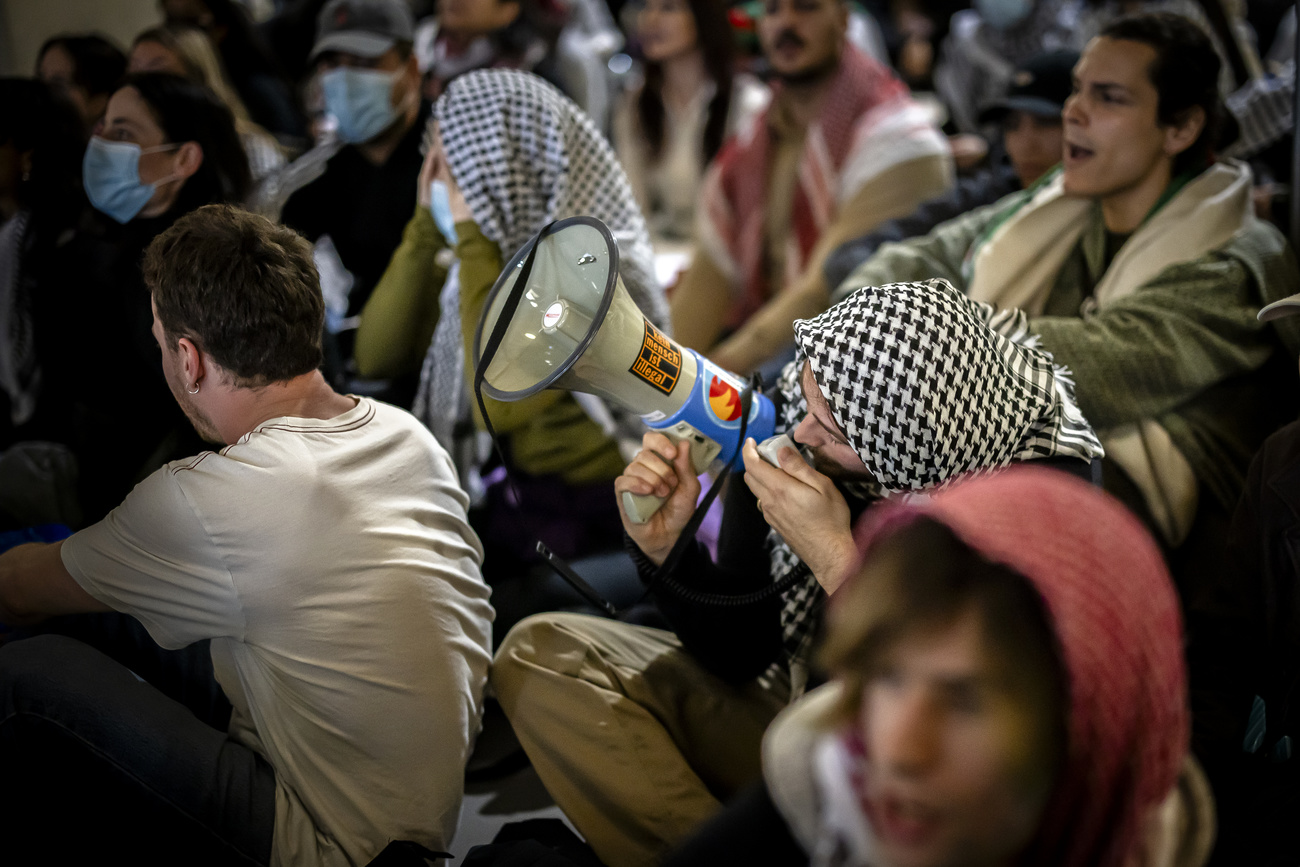Explainer: Switzerland and the recognition of Palestine

On Wednesday Ireland, Spain and Norway announced they were going to recognise a Palestinian state. What has been the reaction in Switzerland, and what are the chances of Switzerland following suit?
More than seven months into the deadliest Israeli-Palestinian war yet, the United States has said there is no way to solve Israel’s security issues and the challenge of rebuilding Gaza without steps towards a sovereign Palestinian state. On Wednesday, Ireland, Spain and Norway said they would formally recognise such a stateExternal link on May 28 to help end the war, get hostages freed and revive peace talks.
Israel began an offensive in Gaza after gunmen led by Palestinian militant group Hamas attacked Israel on October 7, killing 1,200 people and taking 253 hostages, according to Israeli figures. More than 35,000 Palestinians have been killed in Gaza since then, health officials in the Hamas-run enclave say.
+ Our coverage of the Israeli-Palestinian war
The Palestinian Authority, which exercises limited self-rule in the West Bank under Israeli military occupation, welcomed the decision by the three European countries, while Israel recalled its ambassadors in protest, saying such moves amounted to a “reward for terrorism” and could jeopardise its sovereignty and security. Israel rejects any move to legitimise the Palestinians internationally. Finance Minister Bezalel Smotrich said last yearExternal link there was no such thing as a Palestinian people.
What did Switzerland make of the announcement by Ireland, Spain and Norway?
The foreign ministry said on Wednesday the government had “taken note” of the decision. It pointed out that Switzerland had for years supported the creation of a sovereign Palestinian state as part of a two-state solution – “on the basis of the 1967 borders, living side by side with Israel in peace and security”.

More
Timeline: Switzerland and the conflict in the Middle East
However, it believed conditions “do not currently exist” for recognising a Palestinian state. The government would consider such recognition “when it can make a concrete contribution to a peace process in the Middle East”.
In April Switzerland abstained from a vote in the United Nations Security Council on Palestine’s accession to the UN, saying such membership was “not appropriate at the present time” and would not be conducive to “a calming of the situation and peace efforts in the Middle East”.
Conflict occurred in British-ruled Palestine between Arabs and Jews who had migrated to the area, seeking a national home as they fled persecution in Europe and citing biblical ties to the land.
In 1947, the United Nations agreed a plan partitioning Palestine into Arab and Jewish states with international rule over Jerusalem. Jewish leaders accepted the plan, which gave them 56% of the land. The Arab League rejected it.
The state of Israel was declared on May 14, 1948. A day later, five Arab states attacked. The war ended with Israel controlling 77% of the territory.
Some 700,000 Palestinians fled or were driven from their homes, ending up in Jordan, Lebanon and Syria as well as in the Gaza Strip, the West Bank and East Jerusalem.
In a 1967 war, Israel captured the West Bank, including East Jerusalem, from Jordan and Gaza from Egypt, securing control of all territory from the Mediterranean to the Jordan valley.
The two-state solution was the bedrock of the US-backed peace process ushered in by the 1993 Oslo Accords, signed by Yasser Arafat of the Palestine Liberation Organization (PLO) and Israeli Prime Minister Yitzhak Rabin. The accords led the PLO to recognise Israel’s right to exist and renounce violence and to the creation of the Palestinian Authority (PA). Palestinians hoped this would be a step towards an independent state, with East Jerusalem as the capital. The process was hit by rejection on both sides.
The Palestinians remain stateless, with most living under Israeli occupation or as refugees in neighbouring states. Some – mostly descendants of Palestinians who remained in Israel after its creation – have Israeli citizenship.
Who supports a sovereign Palestine?
The decision by Ireland, Spain and Norway means 146 of the 193 member states of the United Nations recognise Palestine as a sovereign state. Most of the Middle East, Africa and Asia do; the US, Canada, Australia, Japan, South Korea and many Western European states do not.
At present, nine EU states support Palestinian statehood. However, most of these countries, such as Poland, Hungary and Romania, belonged to the Eastern Bloc when they had to make the decision in 1988 under pressure from the Soviet Union.
In 2014 Sweden became the first country in Western Europe to recognise Palestine, triggering a bizarre diplomatic spat. “The Swedish government should understand that Middle East relations are more complex than a piece of self-assembled IKEA furniture, and the matter should be handled with responsibility and sensitivity,” said Israel’s then foreign minister, Avigdor Lieberman. “I will be happy to send [Lieberman] an IKEA flat pack to assemble,” replied Swedish counterpart Margot Wallström. “He’ll see it requires a partner, cooperation and a good manual.”
How have the Swiss media reacted?
Swiss newspapers are divided. “Recognising the state of Palestine is the right thing to do,” declared the Tages-Anzeiger in an editorialExternal link on Thursday. “It’s not an attack against Israel, but a step towards a solution.”
“The announced recognition of a Palestinian state by Norway, Spain and Ireland is a well-choreographed move that has caused quite a stir. But it’s neither historic, as the Palestinian camp is now claiming, nor is it a cause for hysteria, as Israel’s government is displaying with the recall of ambassadors and various threatening gestures. This step has no practical consequences because the state of Palestine still won’t exist. Nevertheless, it is important and right.”
The Tages-Anzeiger looked at the numbers: 15 million people live between the Mediterranean and the River Jordan; roughly half are Jewish, half are Palestinian. “Neither side will be able to displace or expel the other. So far, however, only the Jews have their own state, while the majority of Palestinians live under occupation. This leads to ever new rounds of conflict,” it said.
“Despite all the practical problems, the two-state solution is still the best concept for a fair division of the land. Norway, Ireland and Spain have declared their intention to promote this by recognising Palestine. This may seem naive in terms of realpolitik, but it is a noble and understandable intention.”

More
Swiss foreign minister insists on two-state solution for Israel and Palestine
The Neue Zürcher Zeitung (NZZ) was less convinced, reckoning “European wishful thinking doesn’t help”.
“The creation and recognition of a Palestinian state must be the goal and incentive at the end of a successful reform and peace process with Israel,” it said in an editorialExternal link on Thursday. “But Norway, Ireland and Spain are now making advance payments to the Palestinians. At the same time, they are exerting unilateral pressure on Israel, whose government [under Prime Minister Benjamin Netanyahu] is vehemently opposed to the two-state solution. In doing so, they are not advancing peace one centimetre.”
The NZZ said unilateral pressure merely legitimised Netanyahu’s resistance domestically and gave the Palestinians, “many of whom still dream of Israel’s demise”, the wrong signal that they have done enough. “Huge, almost impossible steps still need to be taken by both sides to create the conditions for secure and peaceful coexistence in two states,” it concluded.
What might a Palestinian state look like?
Advocates of the two-state solution have envisaged a Palestinian state in the Gaza Strip and West Bank linked by a corridor through Israel.
Two decades ago, details of how it might work were set out in a blueprint by former Israeli and Palestinian negotiators under the impetus of a Swiss academic. Known as The Geneva Initiative (or Geneva Accord), its principles include recognition of Jerusalem’s Jewish neighbourhoods as the Israeli capital, and recognition of its Arab neighbourhoods as the Palestinian capital, and a demilitarised Palestinian state.
Israel would annex big settlements and cede other land in a swap, and resettle Jewish settlers in Palestinian sovereign territory outside there.
However, an evaluation of the initiative by Switzerland in 2020 concluded that it had become less effective because of a lack of political support on both the Israel and Palestinian sides. In 2022 the Swiss foreign ministry decided to withdraw financially from the initiative by the end of 2023.

More
Switzerland drops the Geneva Initiative. But what’s the alternative?
Is there a way forwards?
Gaza’s fate is the immediate question. Israel aims to annihilate Hamas and says it will not agree to any deal that leaves it in power. Israeli Prime Minister Benjamin Netanyahu has said Gaza must be demilitarised and under Israel’s full security control. He has said he does not want Israel to govern Gaza or re-establish settlements there.
Hamas says it expects to survive and has said any arrangements for Gaza that exclude it are an illusion.
As the Tages-Anzeiger wrote on Thursday: “In the long term, the Jewish state can live in peace and security only if there is a settlement with its neighbours. With their initiative, Norway, Spain and Ireland can provide nothing more or less than a new impetus for this.”

More
Pro-Palestine uni protests to be debated in Swiss parliament

In compliance with the JTI standards
More: SWI swissinfo.ch certified by the Journalism Trust Initiative








You can find an overview of ongoing debates with our journalists here . Please join us!
If you want to start a conversation about a topic raised in this article or want to report factual errors, email us at english@swissinfo.ch.